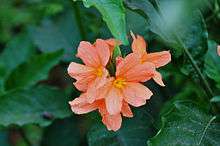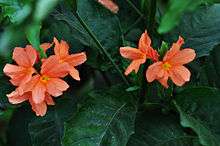Crossandra infundibuliformis
Crossandra infundibuliformis, the firecracker flower, is a species of flowering plant in the family Acanthaceae, native to southern India and Sri Lanka. It is most often found in south Indian region Malenadu and Kerala.
| Crossandra infundibuliformis | |
|---|---|
| Scientific classification | |
| Kingdom: | Plantae |
| Clade: | Tracheophytes |
| Clade: | Angiosperms |
| Clade: | Eudicots |
| Clade: | Asterids |
| Order: | Lamiales |
| Family: | Acanthaceae |
| Genus: | Crossandra |
| Species: | C. infundibuliformis |
| Binomial name | |
| Crossandra infundibuliformis | |
| Synonyms | |
|
Justicia infundibuliformis L. | |
Description
It is an erect, evergreen subshrub growing to 1 m with glossy, wavy-margined leaves and fan-shaped flowers, which may appear at any time throughout the year.[1] The flowers are unusually shaped with 3 to 5 asymmetrical petals. They grow from four-sided stalked spikes, and have a tube-like 2 cm stalk. Flower colours range from the common orange to salmon-orange or apricot, coral to red, yellow and even turquoise.
Cultivation and uses
This plant requires a minimum temperature of 10 °C, and in temperate regions is cultivated as a houseplant. It is usually grown in containers but can be attractive in beds as well. The flowers have no perfume but stay fresh for several days on the bush. A well-tended specimen will bloom continuously for years. It is propagated by seeds or cuttings.

This plant has gained the Royal Horticultural Society's Award of Garden Merit.[2] (confirmed 2017).[3]
The tiny flowers are often strung together into strands, sometimes along with white jasmine flowers and therefore in great demand for making garlands which are offered to temple deities or used to embellish women's hair.

Name
The common name "firecracker flower" refers to the seed pods, which are found after the flower has dried up, and tend to "explode" when near high humidity or rainfall. The "explosion" releases the seeds onto the ground, thereby creating new seedlings.
References
- Christopher D. Brickell (2008). RHS A-Z encyclopedia of garden plants. United Kingdom: Dorling Kindersley. p. 1136. ISBN 1405332964.
- "Crossandra infundibuliformis ". Royal Horticultural Society. Retrieved 9 May 2020.
- "AGM Plants - Ornamental" (PDF). Royal Horticultural Society. July 2017. p. 25. Retrieved 24 January 2018.
| Wikimedia Commons has media related to Crossandra infundibuliformis. |
| Wikispecies has information related to Crossandra infundibuliformis |